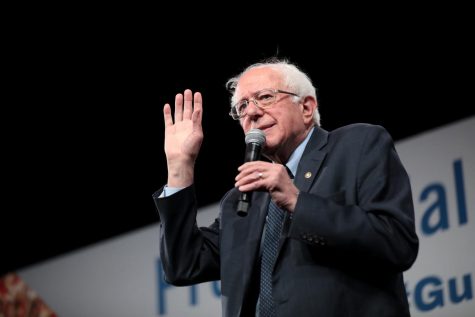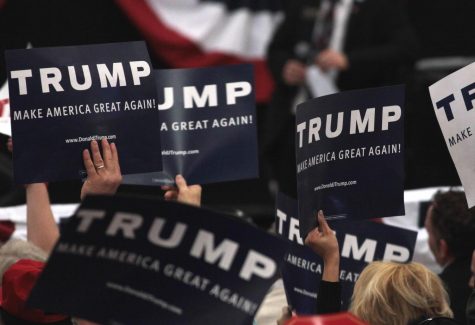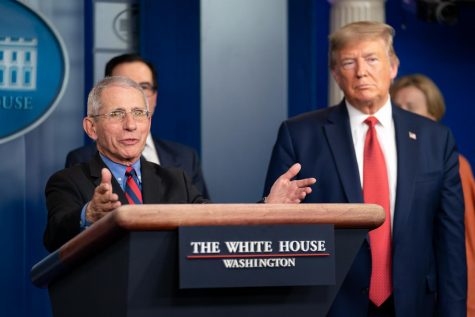Debate Pushes Frontrunner Biden to Shift Further Left
Senator Bernie Sanders faced off against frontrunner former Vice President Joe Biden. (Courtesy of Twitter)
March 25, 2020
The debate on March 15 took place amid a dramatically shifted climate in the race and in the United States at large. From a Democratic field so large that debates had to be split into two nights with ten candidates each, the Sunday night event saw the field whittled down to only two: former Vice President Joe Biden and Vermont Senator Bernie Sanders. Since the previous debate, the dynamic between these two candidates has entirely flipped. In the time which had elapsed, the entire rest of the field had dropped out and offered nearly unanimous endorsements of Biden for the nomination. A dramatic South Carolina comeback, coupled with this unprecedented consolidation of former opponents behind him, delivered Biden a massive surge in national polls and sweeping victories on all election days since.
Perhaps an even larger shift from past debates was the rapid global spread of COVID-19, which by that point had already taken firm grip over national consciousness. The situation was certainly not lost upon debate organizers. No audience was present in conformity with government warnings against large gatherings, the podiums were placed a healthy distance apart and the two candidates exchanged an elbow bump in place of a handshake. While the lack of an audience was a welcome change, limiting disruptions and discouraging cheap applause lines, the circumstances under which the change has come are deeply concerning.
Much of the early part of the debate was naturally focused on this crisis. The candidates struck markedly different tones in addressing the pandemic. Biden stressed the urgency of the situation and the need for swift and immediate action, and while Sanders echoed this to an extent, he leaned frequently on his Medicare for All proposal. For Biden, he seemed to focus on the need to address the current predicament at the expense of addressing long-standing and fundamental weaknesses in our healthcare system, while Sanders had the opposite problem.
The idea that the underlying dysfunctionality of the American healthcare system, which his plans seek to remedy, has contributed to the severity of this crisis underlined by the senator’s statements. However, Sanders failed to pronounce this in any explicit, concise way. Biden repeatedly called for the current crisis to be addressed while framing health care policy discussion outside of that as a distraction, and though I may disagree with that framing, it can be seen as something of a victory for him on this most pressing issue.
Beyond the pandemic, the most contentious moments of the debate came to center on the candidates’ records, both recent and long past. In perhaps the most soundbite-ready moment of the night, Sanders pushed Biden on Biden’s embrace of super PACs and corporate donations. Biden laughed, proceeded to claim that Sanders had the backing of nine super PACs and asked if the senator would like to have them listed. Sanders called Biden on his bluff, asking for the list, at which point the former vice president immediately folded, offering only “come on, give me a break.”
The senator from Vermont went on to scrutinize the former senator from Delaware’s record on protecting Social Security. Biden flatly denied Sanders’ claims that the former vice president had been willing to cut funding to the social safety net, at which point the Vermont senator implored viewers to investigate for themselves on “the YouTube.” Indeed, with a small amount of research, one can find clips of Biden proudly recanting his numerous attempts as far back as 1984 to freeze Social Security and other entitlement payments for the sake of a balanced budget.
In this sparring over records, the remainder of the debate followed much the same pattern. Sanders questioned Biden on his role in the 2005 bankruptcy bill which has long been criticized as a draconian anticonsumer measure. Biden rejected the claim that he was involved in writing the bill, yet he did, in fact, participate in earlier drafts and served as a chief proponent of the legislation. Sanders offered a litany of issues on which the former vice president had made questionable votes including the Iraq War, gay rights, abortion rights and trade deals, all of which Biden largely evaded, rebutting with a critique of his opponent’s record on guns.
The point Sanders was obviously making was that Biden’s career is marked by a failure to summon courage or leadership on a number of key issues; essentially, that he had fallen time and again on the wrong side of history. There may be something more behind the senator’s strategy, however.
This race appears to be reaching an effective end, even the most diehard Sanders supporters would likely admit as much. I do not believe that Bernie Sanders is under any delusions that his chances of securing the Democratic nomination for president are at this point near nonexistent. Rather, I think it more likely Sanders has chosen to remain in the race to use whatever leverage he still has to move Biden leftward and in doing so build some appeal to progressives. Sander’s enumeration of Biden’s past failings was meant to point out why progressives mistrust the former vice president, and perhaps to telegraph to the Biden camp what areas they need to improve on to win over Sanders voters.
In sum, Joe Biden played the part of a steady and measured politician, particularly in facing the challenge of the coronavirus, and though Biden may have fibbed and deflected his way through the debate over his record, he did so affably and confidently enough to avoid any major damage. Although I might think Sanders had the right of many of the issues discussed, in the larger context of the race, Sanders did not perform so outstandingly nor Biden so poorly that the current trajectory with Biden as presumptive Democratic nominee was greatly changed.
However, before Biden grapples with Trump, he will have to do the work to earn some measure of confidence from the left-leaning factions of his party. This is especially true of young people, among whom he has failed to galvanize sizable support for his candidacy, and a significant enough depression of youth turnout could cost him in the general election. Sanders and his team likely realize this, and their continued presence in the race might be in part to push the former vice president on that count. As of this debate, however, Biden has yet to take up this endeavor in any serious fashion.
Kyle Chin, FCRH ’21, is a political science and history major from Malverne, N.Y.












If you want a picture to show with your comment, go get a gravatar.